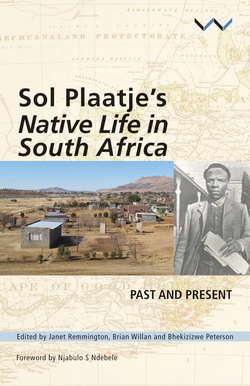Читать книгу Sol Plaatje's Native Life in South Africa - Jacob Dlamini - Страница 20
На сайте Литреса книга снята с продажи.
Impact in South Africa
ОглавлениеPlaatje returned to South Africa in February 1917 to something of a hero's welcome from his own people, the publication of Native Life in South Africa widely regarded as a triumph in the face of great odds. Such was his reputation that he was offered the presidency of the South African Native National Congress soon after his return. He declined the offer, however, saying that ‘the deterioration of my business during my enforced absence made the idea utterly impossible’. Debts accumulated during his time in England added to his problems.
Few copies of the book had as yet found their way to South Africa but the South African prime minister, General Louis Botha, is known to have read it. He was sent a copy by Georgiana Solomon, an old family friend, and he wrote back to her to tell her what he thought of it. Compared to John Harris's, his reaction was restrained. He acknowledged that ‘an opinion held by any man and constitutionally expressed is entitled to respect, however much one personally may differ from it’, and that it would ‘certainly not in any way adversely influence my Government in its dealing with the Natives of the Union’. Indeed, he went on: ‘I welcome any criticism honestly given and the book may be of value in giving publicity to views, possibly held by a section of the Native community, which may perhaps be in conflict with those held by other sections of the Union's inhabitants; and where differences of opinion exist, full and free discussion is most desirable.’
Not surprisingly, however, he disagreed with the substance of the book. ‘Mr Plaatje,’ he said, ‘is a special pleader, and, consciously or unconsciously, in his book he has in my opinion been somewhat biased in his strictures on the Government in regard to the Natives' Land Act: he has exaggerated incidents which tell in his favour and suppressed facts that should be within his knowledge which would show the honest attempts made by the Government to avoid the infliction of hardship in carrying out a principle which, you must remember, was sanctioned by the Legislature.’ He believed there was ‘a sincere desire to do justice to the Native Races in our intercourse with them’, and that eventually relations between black and white would be worked out in an amicable manner – ‘although to impatient souls progress towards this ideal may at times be slow and halting’. Mrs Solomon, he clearly felt, fell into just such a category.20
General Botha expressed his views on Native Life in a letter to Mrs Solomon in August 1916. It was not until the following year, however, when copies of the book began to circulate in South Africa, that it had a wider impact. There were several reviews and they recognised, like those in England, that Plaatje had presented a very strong case. The Johannesburg Star, for example, thought the book was ‘of unusual importance’, warning that ‘the scandalous way in which natives were treated under the Land Act’, could well lead to wider disaffection and the danger that ‘the natives might eventually combine against us’.
What really generated interest in Native Life, however, were the references to it during debates in the South African House of Assembly. ‘Last month,’ Plaatje wrote in June 1917, ‘a Boer member – Colonel Mentz, Minister of Lands' – referred to it as “a scurrilous attack on the Boers”.’ ‘A chorus of English members,’ he added, ‘promptly defended it so vehemently that even in subsequent days when the book was quoted by English members during the debates not one had the nerve to attack it again.’ It was noticeable, too, thought The Star, that none of those who criticised the book ‘ever denied the accuracy of its statements or questioned the authenticity of the details’.
Reports of these exchanges in Parliament brought forth orders from all over South Africa. Unfortunately, for a while no stock was available and Plaatje had a frustrating wait for copies of the third edition of the book, printed in England in February 1917. This differed from the second edition in having his analysis of the report of the Beaumont Commission at the back rather than the front of the book, and in including a map to show the distribution of African and European landholding in South Africa.
The consignment eventually arrived in South Africa in July and soon sold out. Having heard from his friend William Cross that copies were on their way, Plaatje telephoned the Johannesburg branch of CNA (the leading chain of booksellers and stationers) to see if they had arrived so that he could obtain some copies for himself, only to discover that their consignment of 100 copies were all sold within two days. Consequently, no provincial branches of CNA received any copies at all (but presumably some further copies did at some point reach them).
